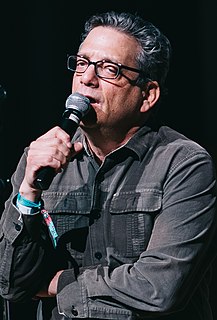A Quote by Tatiana Schlossberg
I'm a journalist, not an advocate, so I approached researching and writing the book the same way that I do any other reporting. But when you're writing for yourself, you have a little more room to say what you think.
Related Quotes
I'm more or less happily writing Chapter Six of The Graveyard Book. I say more or less as I'm at that place where I hope that the book knows what it's doing because right now I don't have a clue - I'm writing one scene after another like a man walking through a valley in thick fog, just able to see the path a little way ahead, but with no idea where it's actually going to lead him.
The difference between writing where you know where to draw the line and writing where you're being way too mean is whether you can tell that the writer is not talking to family or friends anymore. Generally, if you say something bad about somebody on stage, you need to say two bad things about yourself. A lot of times, I think I'm the worst person in the room.
The process of writing a book is infinitely more important than the book that is completed as a result of the writing, let alone the success or failure that book may have after it is written . . . the book is merely a symbol of the writing. In writing the book, I am living. I am growing. I am tapping myself. I am changing. The process is the product.
I have a hard time writing. Most writers have a hard time writing. I have a harder time than most because I'm lazier than most. [...] The other problem I have is fear of writing. The act of writing puts you in confrontation with yourself, which is why I think writers assiduously avoid writing. [...] Not writing is more of a psychological problem than a writing problem. All the time I'm not writing I feel like a criminal. [...] It's horrible to feel felonious every second of the day. Especially when it goes on for years. It's much more relaxing actually to work.
Essentially, the scripts are not that different. Let's say, in literary terms, it's the difference between writing horizontally and writing vertically. In live television, you wrote much more vertically. You had to probe people because you didn't have money or sets or any of the physical dimensions that film will allow you. So you generally probed people a little bit more. Film writing is much more horizontal. You can insert anything you want: meadows, battlefields, the Taj Mahal, a cast of thousands. But essentially, writing a story is writing a story.
The very dull truth is that writing love scenes is the same as writing other scenes - your job is to be fully engaged in the character's experience. What does this mean to them? How are they changed by it, or not? I remember being a little nervous, as I am when writing any high-stakes, intense scene (death, sex, grief, joy).
































